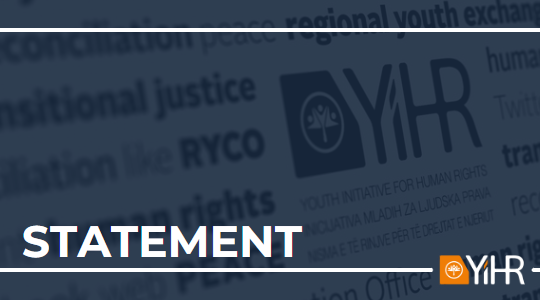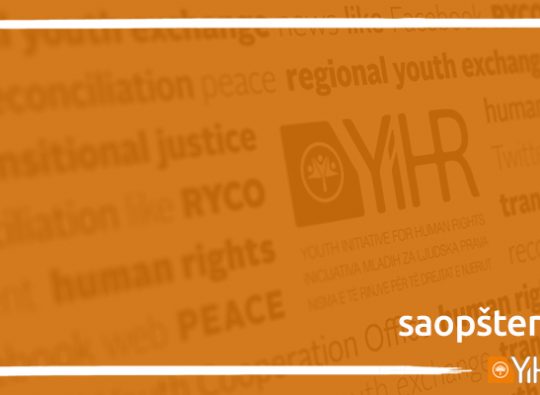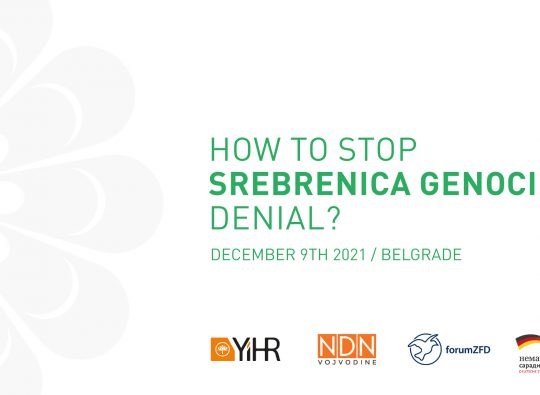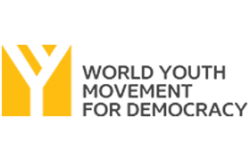The speakers on the panel were the president of the Movement of Free Citizens (srb. Pokret slobodnih građana – PSG) Pavle Grbović, lawyer Relja Radović, and spokeswoman for the Srebrenica Memorial Center Almasa Salihović. The conversation was moderated by the programme coordinator of YIHR, Vanja Đurđić. Activist Mila Pajić, one of the five YIHR activists who have been receiving threats and insults for days because of the video in which they supported the adoption of the draft of the UN General Assembly resolution regarding the Srebrenica genocide, also addressed the audience. After the panel, YIHR programme director Sofija Todorović addressed the audience and announced that YIHR will send a letter from Serbian youth to the President of the UN General Assembly by Friday, April 26, as another form of support for the adoption of the resolution.
Almasa Salihović stated that the adoption of the resolution is important for future generations, who can once and for all break with the ideology that led to all of the war crimes, including the genocide in Srebrenica. As the spokeswoman of the Srebrenica Memorial Center, she pointed out that, while the resolution is most important for the region itself, its significance is reflected in its global character as well. According to Salihović, the Srebrenica Memorial Center collects and documents the stories and belongings preserved by the families of the victims and presents its activities such as exhibitions, visits, and reports to the public.
Pavle Grbović added that often when people in Serbia talk about Srebrenica, they portray it in a manner as if it was a natural disaster, not a genocide that was committed by someone. The PSG president pointed out that the real scope of this resolution should not be overestimated because “no one will bring the victims back, and neither justice nor peace will be brought by the resolution.” However, Grbović stated that peace must be brought by the institutions, society, and political elites, while the resolution brings moral satisfaction to the victims of genocide.
Grbović also emphasized that 14 years had passed since the adoption of the Declaration of the National Assembly of Serbia in 2010. “The mere fact that the word genocide is not explicitly mentioned in the Declaration does not mean that the crime is not qualified as such, because the text refers to the ruling of the International Court of Justice (ICJ). It was solely a linguistic construction to avoid the word genocide, which is meaningless,” commented Grbović. The President of PSG added that “if a new Declaration would be adopted tomorrow and in it, it says genocide, and then they say that we are all traitors because we speak here, then it is all meaningless. A fundamental change is needed”.
Lawyer Relja Radović has repeatedly referred to the legal aspects and established facts regarding the genocide in Srebrenica. He referenced cases held before two international courts: the International Criminal Tribunal for the former Yugoslavia (ICTY) and the ICJ. Radović emphasized that these courts determined that “genocide was committed in Srebrenica, and that even though Serbia is not responsible for committing genocide, it is responsible for not preventing it”.
He noted that the UN General Assembly resolution on the Srebrenica genocide isn’t legally binding, but judgments from the International Court of Justice carry legal weight. In this regard, Radović said that “Serbia isn’t required to admit the genocide but should refrain from denying it. This is not about whether or not someone likes the use of the word genocide. This is about respect for the rule of law in the international community and how much Serbia contributes to that”.
When asked whether genocide denial has decreased in Bosnia and Herzegovina after the 2021 changes to the Criminal Code, Almasa Salihović pointed out the reports on denial from the Memorial Center that “show a decrease in denial in the public sphere of Bosnia and Herzegovina, but when this topic resurfaced, a wave of denial stroke again, lead by the same people. No one has been prosecuted in Bosnia since the adoption of the new law that prohibits denial. Some charges were raised against some people, but that is a question for the Prosecutor’s office.”
The Memorial Center spokeswoman responded to Milorad Dodik’s announcement of visiting Srebrenica on the UN General Assembly resolution adoption day, with “one hot-head is enough for the masses to follow.” She pointed out that such actions are inciting fear among survivors. Pavle Grbović criticized Serbian authorities’ plan to publicly display Serbian flags on the same day, calling it “symbolism without symbols” that can rather easily turn into “an investigation about who displayed the flag and why.”
Activist Mila Pajić, talking about the YIHR video in which she supported the UN General Assembly resolution, stated that the activists consciously took part, knowing that it would have some consequences, but expressing a belief that our society still has potential for development, as well as that “threats and comments did not come from genuine individuals who really mean it, but from a community run by a specific group of people with vested interests.” Talking about the need for open dialogue in society, she stated that “we can talk about the war, but what happened in Srebrenica was determined with court verdicts, so we can educate ourselves.”
Finally, YIHR programme director Sofija Todorović pointed out that Serbia has missed an opportunity to discuss the significance of the resolution as a basis for peace. She reminded that criminal charges were filed due to threats against five YIHR activists and urged the government to condemn all threats. Due to the Serbian government’s genocide denial and a campaign before the UN, YIHR will send a letter to the President of the UN General Assembly by Friday of this week, amplifying another perspective regarding this issue from our country.












